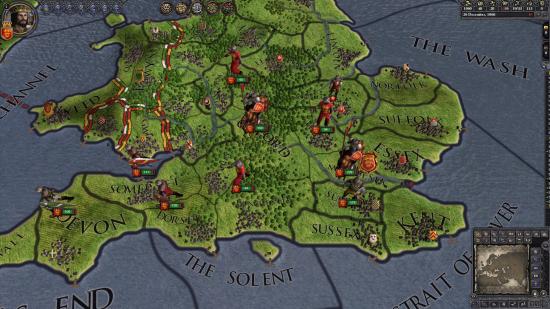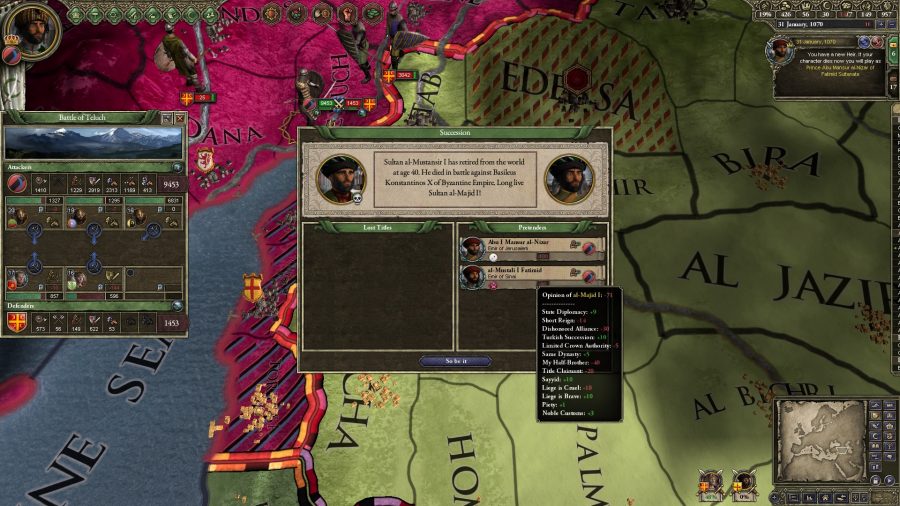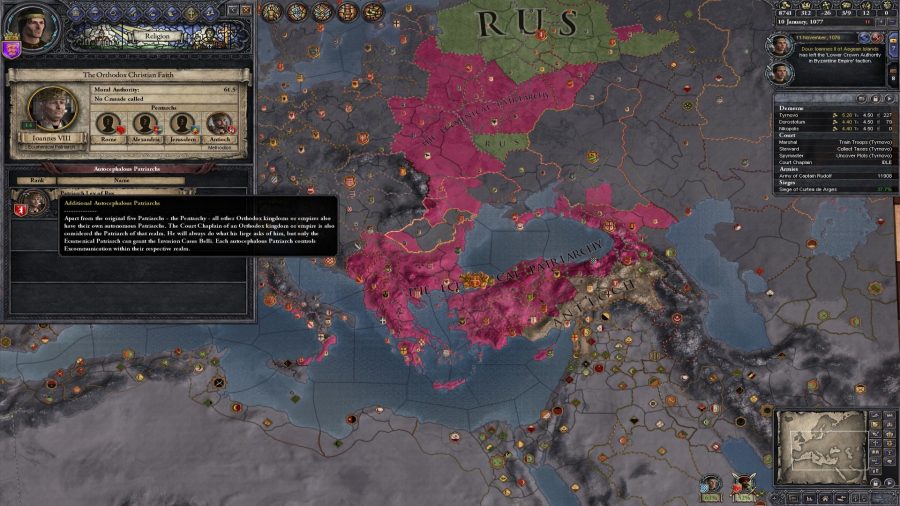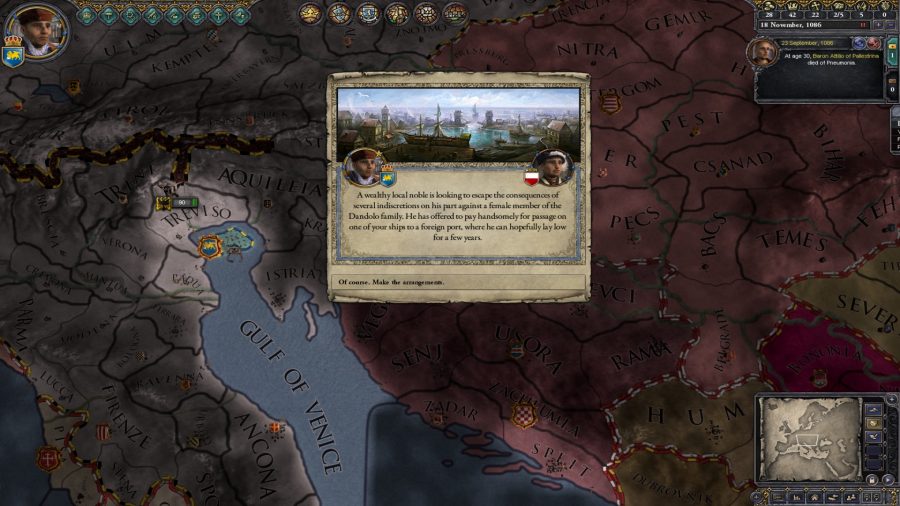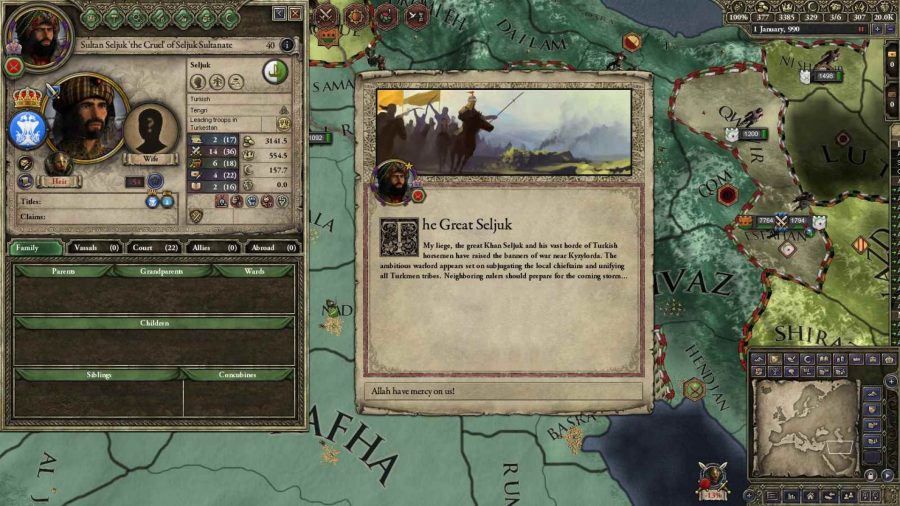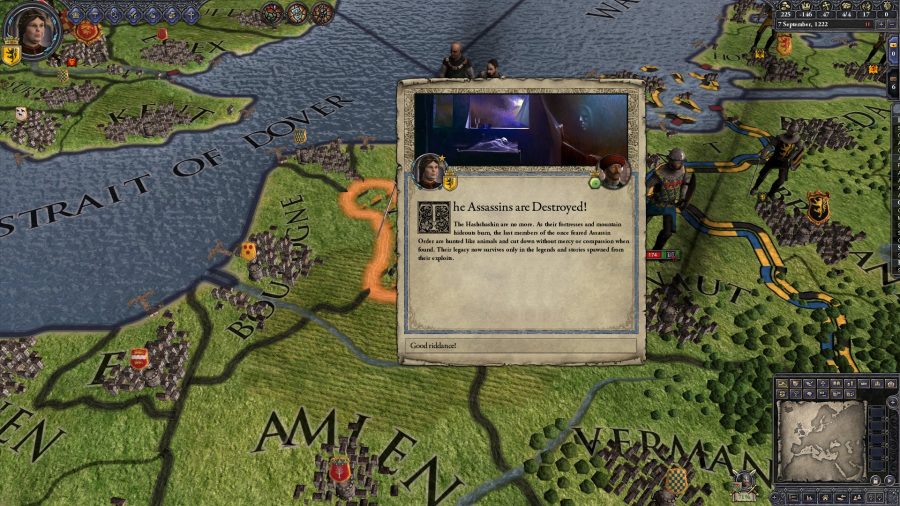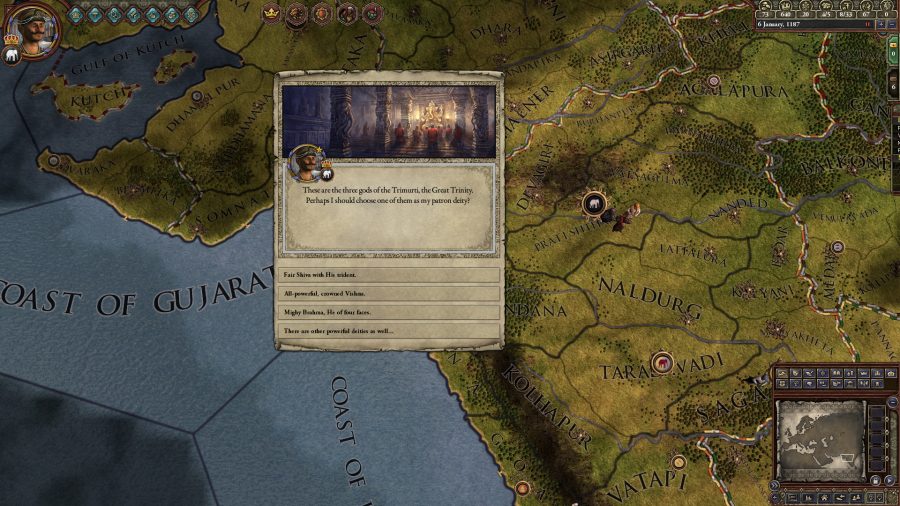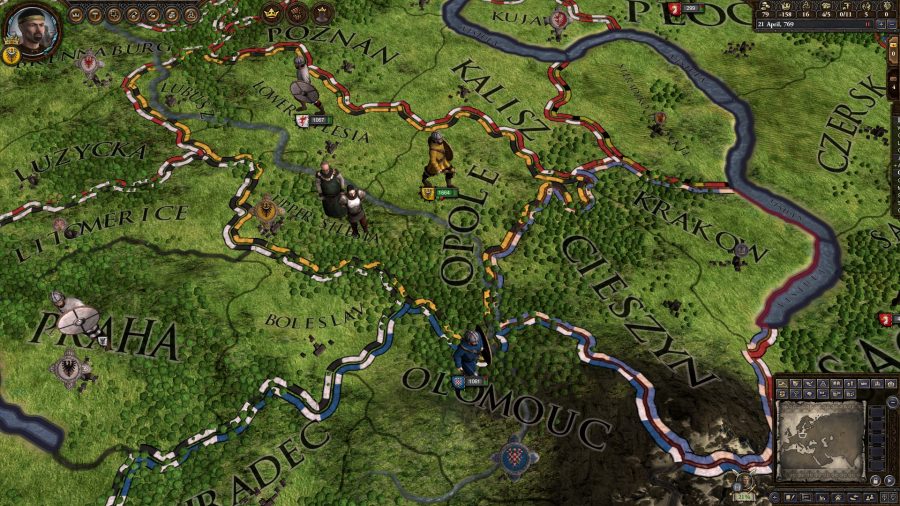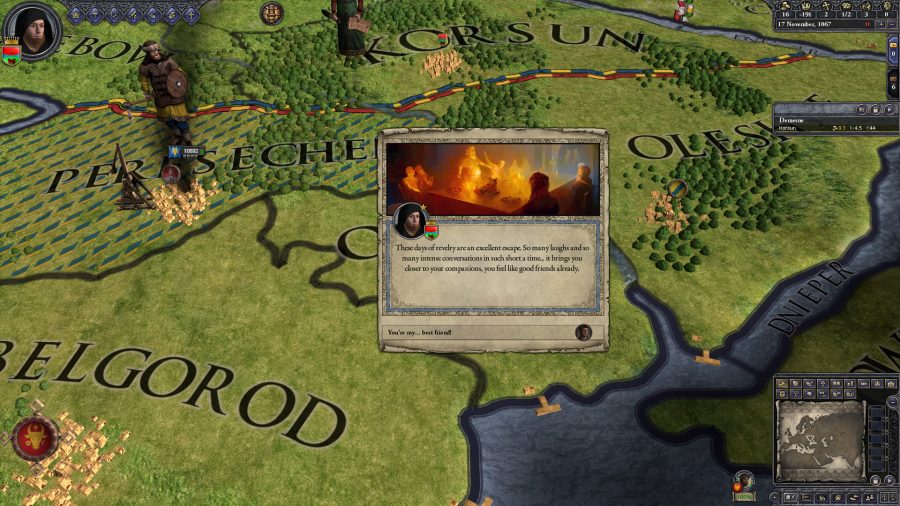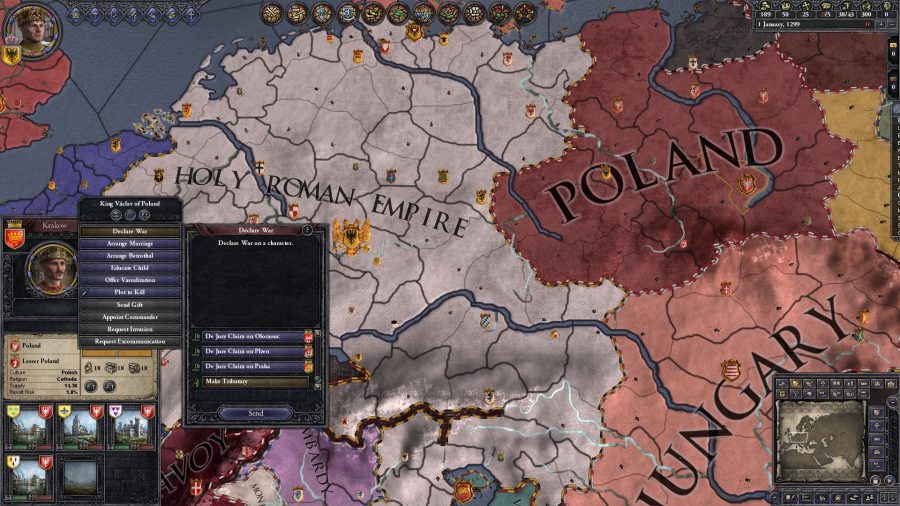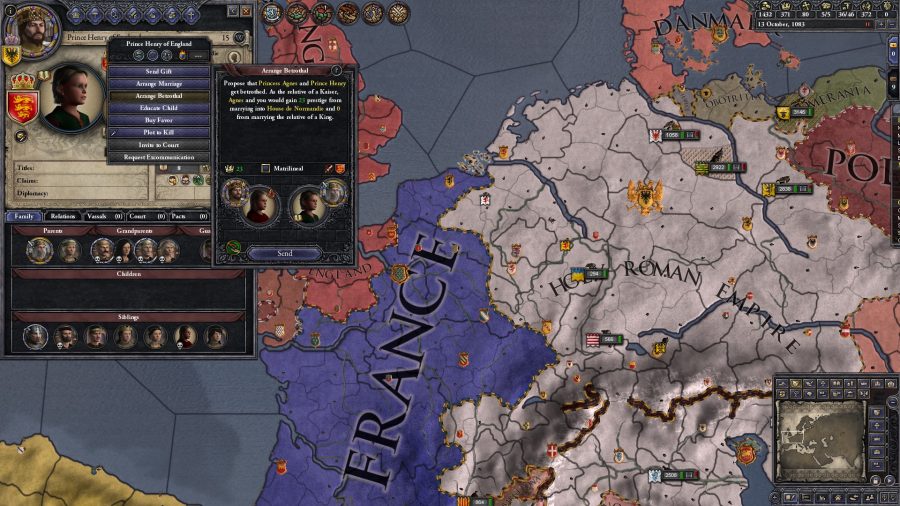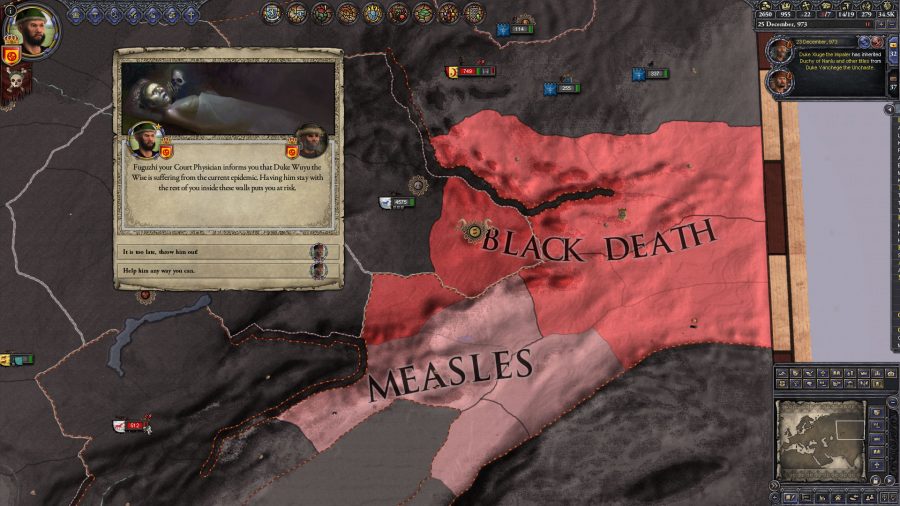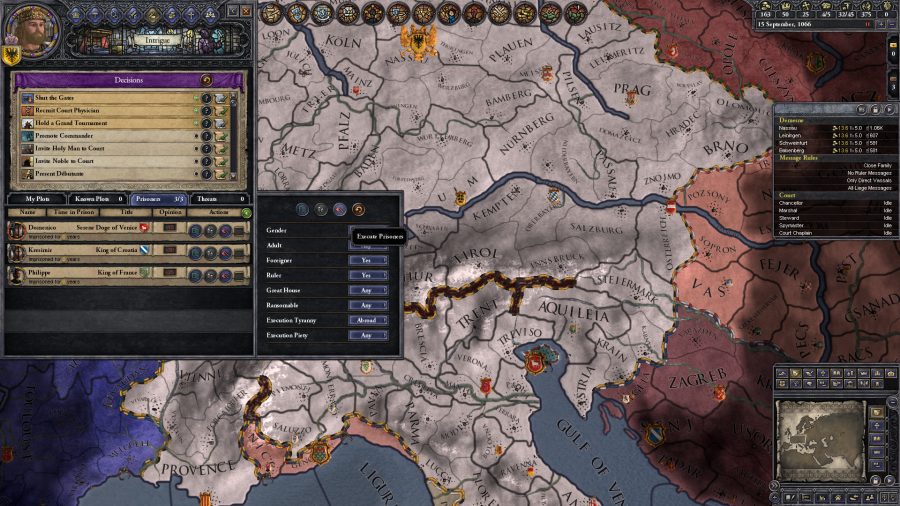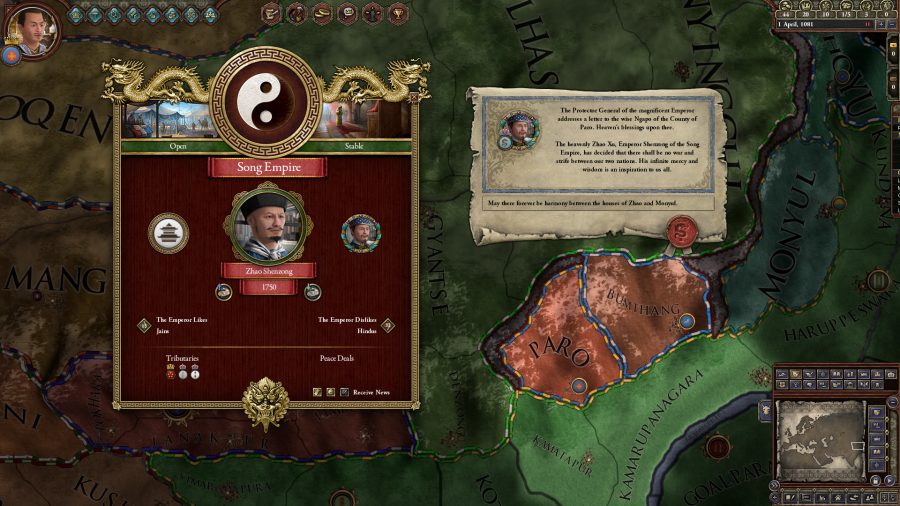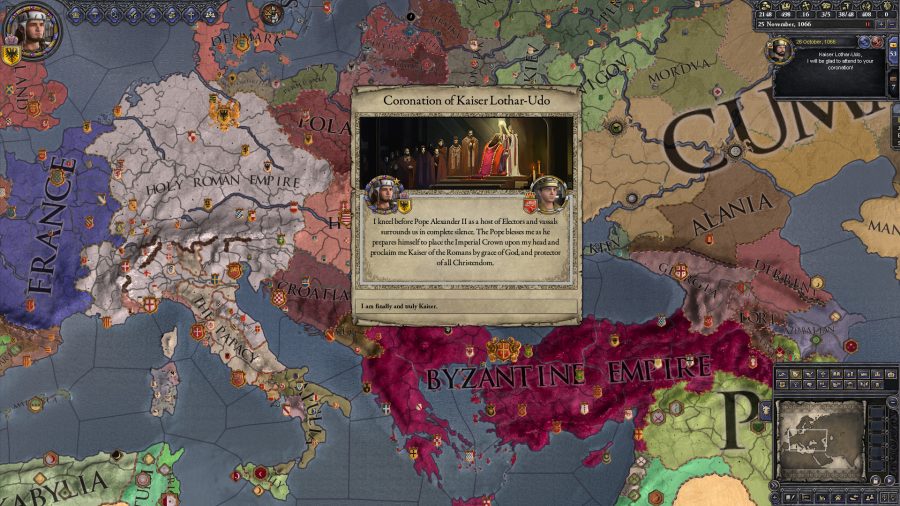Crusader Kings II is the grand strategy game that launched a thousand DLCs, spawning an (at the time) unprecedented system of post-release support that could see expansions releasing nearly a decade after the original launch. So many packs have been released that we figured a CK2 DLC guide would be needed to help sort them out. With Crusader Kings III now assuming the throne (check out our CK3 review and our CK3 tips guide), it must be noted that DLC support for CK2 has finally coming to end.
It’s now one of the best free PC games available, since Crusader Kings 2 went free-to-play. But the real costs are with the expansion packs. These represent a library of extra stuff that comes with a hefty price-tag. Across 15+ DLCs (if we’re just counting the major, gameplay-altering ones), you can expect to pay just under $300 (at full price) to acquire the ‘complete’ experience.
A recent development that may prove interesting is that the entire expansion catalogue is now being made available via a subscription service. We’ve added an extra note on this below, but even with this new way of accessing CK2 DLC packs, we’ve taken the time to break down each major expansion in terms of what it does, and whether it’s worth the money you (usually) pay for it.
Crusader Kings 2 DLC Guide
Here is a breakdown of all the Crusader Kings 2 DLC:
- Sword of Islam
- Legacy of Rome
- Sunset Invasion
- The Republic
- The Old Gods
- Sons of Abraham
- Rajas of India
- Charlemagne
- Way of Life
- Horse Lords
- Conclave
- The Reaper’s Due
- Monks and Mystics
- Jade Dragon
- Holy Fury
Crusader Kings 2 DLC Subscription
For $4.99 / £3.99 a month, you can access the entire library of Crusader Kings II expansions. Not only does this include all of the major ones we talk about below, but you also get the various cosmetic packs and unit packs, the portrait packs… even the more niche offerings like the CK2 to EU4 savegame converter.
At that monthly price – and using the full retail price of each pack – it’d take you around five years before you’d have ended up paying more than it would cost to just buy the packs individually. This doesn’t take into account steam sales, of course, and at this point CK2 DLC is made available for extreme discounts during the major sales events.
Still, if nothing else this may be a good opportunity to try out all of the major packs and figure out which ones you actually want. You can use the below as rough guide, and then subscribe to confirm our analysis and then just wait for the sales to pick up the packs you want (then unsubscribe).
SWORD OF ISLAM
Highlights
- Unlocks Muslim rulers (base CK2 only allows you to select Christian characters) with loads of new mechanics
- Decadence can cause your dynasty to collapse if you engage in immoral behaviour
- A new succession type for Muslim realms in which all legitimate sons have a shot at inheritance based on their prestige
- Ability to have up to four wives
- New CBs (reasons to go to war) specific to the Muslim world
- Tons of new, Muslim-specific events and decisions, such as going on Hajj to Mecca
Is it worth it?
As you’re going to discover with many CK2 expansions, it depends highly on whether or not you are interested in playing the new content it unlocks. In Swords of Islam, you can play non-Muslim rulers forever and the fact that you don’t have this DLC installed will have no effect on you at all. They are a rather large, distinct, and interesting sphere of CK2’s world, however, and quite worth giving a spin if you’re looking for something different from feudal Catholic Europe.
LEGACY OF ROME
Highlights
- New decisions and events for the Byzantine Empire, allowing them to restore the Roman Empire by capturing its former territories
- Orthodox rulers can Mend the Schism, re-uniting the Western and Eastern halves of the church and rendering Roman Catholicism a heresy
- A new army type called retinues, in contrast to feudal levies which must be called to war each time, represent standing armies like those of the Byzantines that exist on the map at all times and never need to be disbanded
Is it worth it?
Absolutely. Legacy of Rome is only £4 / $5 /€5, and retinues are such an essential element of late game CK2 that you’re basically handicapping yourself by not having access to them. The other features are fairly specific to Byzantium and other Eastern Orthodox rulers, but retinues alone put Legacy of Rome on the essential list – especially since it tends to go for pocket change on sale.
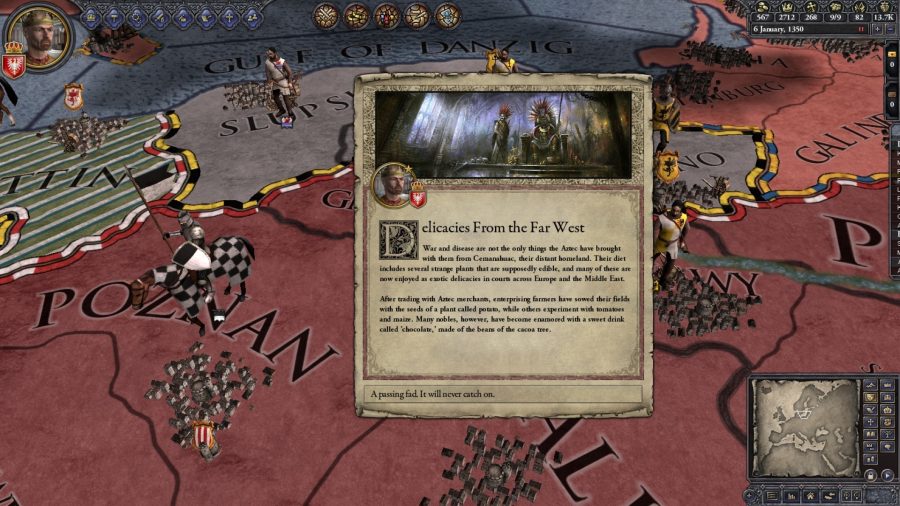
SUNSET INVASION
Highlights
- Adds an ahistorical invasion of technologically-advanced Aztecs who arrive from across the Atlantic to conquer Europe in the late game
- Introduces Nahuatl culture and the Aztec pagan religion
Is it worth it?
Sunset Invasion is probably CK2’s most controversial expansion, and the only highly anachronistic one, so that’s a bit of a loaded question. It’s probably the least essential expansion, and I play with it turned off the vast majority of the time.
That being said, there is enjoyment to be had if you go in knowing you want an unrealistic and almost silly campaign that’s quite a bit different from what CK2 has to offer otherwise. It also puts pressure on Western Europe at a time when things can start to feel static, similar to the role the Mongols play in Eastern Europe.
THE REPUBLIC
Highlights
- Unlocks playable merchant republics, such as Venice, Genoa, and the Hansa
- Can build trade posts in other rulers’ provinces to extend their trade networks and get richer
- Rather than playing a hereditary ruler, you play the head of one of a number of powerful families who try to influence elections to stay in power
- Lots of new events specific to republics
Is it worth it?
Like Sword of Islam, The Republic is entirely situational. You won’t see any of its effects if you only ever play feudal rulers. And given that there are a fairly small number of republics in the game’s timeframe, it opens up fewer, new options than most of the character-unlocking DLCs.
Still, republics offer a rather unique way to play the game that can help keep things from feeling stale, especially for players who love to amass gold and spend it on cool stuff.
THE OLD GODS
Highlights
- Unlocks playable pagans (Norse, Slavic, Suomenusko, and Romuva) and Zoroastrians with tons of new mechanics for each
- Adds a new start date in 867, the height of the Viking Age
- Lots of new Viking mechanics, such as coastal raids and being able to sail your longships up major rivers
- Revolts are now led by a named leader character who can be captured, killed, or reasoned with like other rulers
- Adventurers are a new AI character type, representing warriors with no land who gather an army and set off to conquer distant lands
- Adds the ability to “reform” a pagan religion to make it more capable of competing with the Abrahamic faiths
- Zoroastrians can restore the old Persian Empire by reclaiming it from the Muslim conquerors
Is it worth it?
Absolutely. This is still probably my overall favourite CK2 expansion, though I admit that I’m heavily biased towards all things Norse pagan. The 867 start date is far more volatile and dynamic than 1066, with greater ahistorical possibilities, while not straying so far out of the feudal age that it feels like a bad fit for CK2’s mechanics. Which is the impression I often get from the even earlier 769 start added in the Charlemagne expansion, which we will discuss below. Pagans and Zoroastrians are a ton of fun, as are their respective mechanics for cementing their places in history.
SONS OF ABRAHAM
Highlights
- Introduces the Catholic College of Cardinals, which can be manipulated to put a friendly Pope in power
- Adds Judaism as a playable religion with new events, decisions, and mechanics
- Two new Catholic holy orders
- New holy orders for religions that didn’t have them already (such as Zoroastrians)
- The ability to borrow money from the Knights Templar
- A huge number of new events, many for Abrahamic faiths
- Christians can now go on pilgrimages to holy sites
- Muslims can side with the Mutazilitie (science-focused) or Ashari (piety-focused) schools
- Christians can force relatives and courtiers to take the vows and become a monk or a nun
Is it worth it?
Sons of Abraham is the first major expansion to expand on Catholic Europe, the area the game focused on at release. If that’s your thing, this one is borderline essential. The new holy orders make a big difference in making some previously bare bones religions feel fleshed-out. Judaism gets some pretty cool stuff, like being able to restore the Kingdom of Israel, which makes for a fun playthrough.
The new Muslim mechanics offer an interesting trade-off, allowing you to continue the scientific revolution of medieval Islam at the risk of potentially offending some of your more devout coreligionists. There’s something for everyone, but Muslim, Christian, and Jewish characters will get the most out of it.
RAJAS OF INDIA
Highlights
- Unlocks playing as the Buddhist, Hindu, and Jain rulers of the Indian subcontinent
- Tons of events and decisions for the religions listed above
- Members of Indian faiths are tolerant of one-another, so a Buddhist ruler isn’t obligated to convert his Hindu subjects
- War elephant units for Indian rulers
- Buy CK2 Rajas of India today
Is it worth it?
Rajas of India is very easy to ignore if you’re not particularly interested in the Indian subcontinent, especially given its relative distance and isolation from the rest of the map.
The Indian religions are each flavourful and interesting, but to this day still feel less fleshed-out and more disconnected from the rest of the map. There’s plenty of enjoyment to be had, but it’s definitely among the least essential DLCs.
CHARLEMAGNE
Highlights
- A new, even earlier start date of 769 AD, when Charlemagne was competing with his brother Karloman to rule over the Franks
- A bunch of events and decisions tied to Charlemagne and Karloman that give a number of different ways for their fates to play out
- Empires with sufficient legalism (like Byzantium) can now appoint titles to temporary governors called viceroys instead of handing them out as permanent, hereditary, feudal holdings
- Adds the playable Zun religion
- Can now create custom kingdoms and empires not based on historical ones if you own enough land
Is it worth it?
I have mixed feelings about Charlemagne. At first, I loved the 769 start. But the more I’ve played it, the more two issues become apparent. One: CK2 was not designed to handle this time period. Two: 700 years (769 – 1444) is just too long to play a single campaign. I almost always get bored long before I’m finished, which makes the extra centuries more of a burden than a boon.
The story events with Charlemagne are a lot of fun to play through a time or two, but leave the dozens of subsequent generations feeling less dramatic and dynamic. I find it hard to say this expansion isn’t worth ever getting. Quite the contrary. But I don’t consider it nearly as essential as I once did.
WAY OF LIFE
Highlights
- Adds character focuses, such as War, Family, and Theology, that each have many associated events to flesh out the day-to-day life of your character
Is it worth it?
It doesn’t sound like much, but the answer is definitely yes. No matter what kind of character you’re playing, Way Of Life’s character focuses help break up the monotony, adding a greater sense of reality to the world, while breaking up the long chunks of time when there might be nothing politically interesting going on. Some of the best events in CK2 came out of this DLC, and I’d have a hard time without it.
HORSE LORDS
Highlights
- New playstyle for nomadic hordes that’s vastly different from their settled counterparts
- Clans can vie for power to become the Great Khan
- Feudal holdings can be razed for pasture land, increasing the potential population of your horde
- New succession mechanics where only strong rulers can command respect, allowing vast hordes to collapse with the death of one man
- Members of your court and family can now found mercenary bands and gather followers to fight with them for pay
- Adds the Silk Road trade routes, which can be fortified with trade posts to give their owners more income
- Can now force another ruler to become your tributary in war
Is it worth it?
We’re back in firmly situational territory here. The hordes can be a ton of fun to play, but are really emblematic of what I see as the developers trying to “hack” CK2’s systems and make them do things they were never intended for. The somewhat awkward management of nomad holdings and governments can get you to wondering why they didn’t just make a new game about horse nomads, instead of trying to shoehorn them into a feudal incest simulator.
If you don’t plan on playing as a horse nomad tribe or holding land along the Silk Road, you can definitely skip House Lords.
CONCLAVE
Highlights
- Your ruler’s council now plays a much larger role, able to vote on certain issues and manoeuvre to gain more authority at the expense of the monarch
- A new system of favours allows exchanges of resources for votes on the council
- Powerful vassals will now be very unhappy if not on the council.
- Rework of regencies
- New system for educating and influencing the traits/stats of young children
- Rework of realm laws
- Able to change laws defining the status of women in your society, giving them more equality over time
Is it worth it?
For my money, absolutely. Conclave was one of the more controversial expansions at launch due to the addition of some questionable features (and I was one of the loudest complainers!) that have since been revised and/or made toggleable game options. But the core of it, the new council mechanics, is fantastic.
It brings new depth and strategy to internal politics, makes playing a vassal of a higher ruler much more fun, and more realistically simulates the simple fact that most rulers in the middle ages were not even close to being unchallenged, absolute monarchs. Getting your way is a lot more satisfying when you have to manipulate a bunch of people to do so.
THE REAPER’S DUE
Highlights
- Rework of the disease system including symptoms, new diseases, and treatment options via a new appointed office called Court Physician
- Epidemic diseases can depopulate a province, lowering income and manpower, which takes time to recover from
- Rulers can now build hospitals in provinces, which protect to some extent against depopulation
- Provinces that have not been ravaged by war or disease can now become prosperous, increasing income and manpower recovery
- Crown Focus allows rulers to choose one of their provinces to focus on, increasing its prosperity
- Tons of new events, including many related to the revamped Black Plague
- Adds the ability to seal yourself in your castle to avoid an epidemic, triggering many new events related to isolation
- New ways to torture and execute prisoners
Is it worth it?
Before Reaper’s Due, I was always complaining about how one of the most momentous, continent-changing events of the Middle Ages, the Black Death, was barely represented in CK2. Now, it’s much more of a world event with fanfare and unique mechanics. And while it still doesn’t trigger the kinds of cascading historical changes it did in the real world, it’s still nice to see it getting more recognition. The court physician and prosperity systems are also useful and interesting no matter whom you’re playing.
MONKS AND MYSTICS
Highlights
- Adds Societies to the game, which characters can join and rise through the ranks of to gain access to new abilities
- The Hermetic society focuses on esoteric learning and the secrets of the cosmos
- Lucifer’s Own is devoted to Satan and gives its members dark powers to prolong their lives and harm their enemies
- The Shia Hashashin are masters of murder and intimidation
- Monastic orders for many religions allow you to pursue a life of devotion and purity
- Lots of new events related to societies
- Characters now have inventories for storing weapons, artefacts, and symbols of office that have an impact on stats
Is it worth it?
Some of the societies are really cool, but also nearly as unrealistic as Sunset Invasion at the higher levels. So if you want a purely historical playthrough, it’s probably safe to skip Monks and Mystics.
The new events are really the highlight of it all. They’re well-written and often shocking, and combined with those added in previous expansions like Reaper’s Due and Way of Life, really give your character enough to do that you can play CK2 almost as an RPG or a visual novel instead of a strategy game about conquest. At least, until they start to get repetitive – which they definitely will if you stay with the same society for long enough.
Jade Dragon
Highlights
- Adds China as an off-map power that can conquer territory on the map by way of the Western Protectorate title, demand tribute, or even be conquered to install your dynasty on the throne
- New Silk Road mechanics that react to the changing political situation in China
- Rally points that allow you to raise all of your levies and have them travel automatically to a specified province
- New CBs that make it easier for small rulers surrounded by same-religion rivals to expand
- Bön and Khurmazta religions (also unlocked if you own The Old Gods)
- Taoism religion (also unlocked if you own Rajas of India)
Is it worth it?
Rally points and the new CBs are nice, all-around quality of life features. But what will really determine how much bang you get for your buck with Jade Dragon is how often you like to play on the Eastern edge of the map. Having the Chinese Emperor to deal with makes the region feel very different, both in terms of opportunities and challenges. The huge number of new events and diplomatic options tied to China liven things up as well. Obviously, however, the further from China your realm is located, the less any of this is going to matter.
Holy Fury
Highlights
- The final DLC for CK2, that actually features mechanics and bits back-ported from CK3’s design
- Adds ‘Random’ and ‘Shattered’ World generation options. One lets you play on a completely fictional map of Europe, a la Random New World from EU4, while the other keeps the land-mass in place and simply changes up the faction dynamics and configurations
- Legendary Bloodlines allow for really good characters to pass on buffs and bonuses to their descendants. Players can found their own, but there’s also some pre-made historical ones as well
- Some new event chains to go along with the (free) revamped Crusader mechanics
- Extremely pious characters can become saints, and Feudal Kings must find Clergy to crown them and legitimise their authority
- Lots and lots of other changes big and small
Is it worth it?
It’s a strong yes, although there’s an equally strong caveat. Holy Fury manages to breathe new life into the wider game thanks to the Random/Shattered world options. Much like the Random New World from EU4, your mileage on this may vary, but Holy Fury also manages to completely revitalise the Christian game specifically on more standard map settings through new Crusade and Character mechanics.
We didn’t think CK2 could do it again, but by gosh, it’s done it again. It’s almost tragic in the way that this is the game’s final expansion, although the development team mentioned that they wanted to send CK2 off on a high note. I’d say they definitely achieved that.
More like this: Here are the best strategy games on PC
Unfortunately, if you lack DLCs like Sword of Islam, Sons of Abraham, and Rajas of India you may accidentally run into several ‘Game Over’ states if you switch your character to a religion you’re not allowed to play as. Also, the free patch once again proves to be as strong as the DLC itself.
